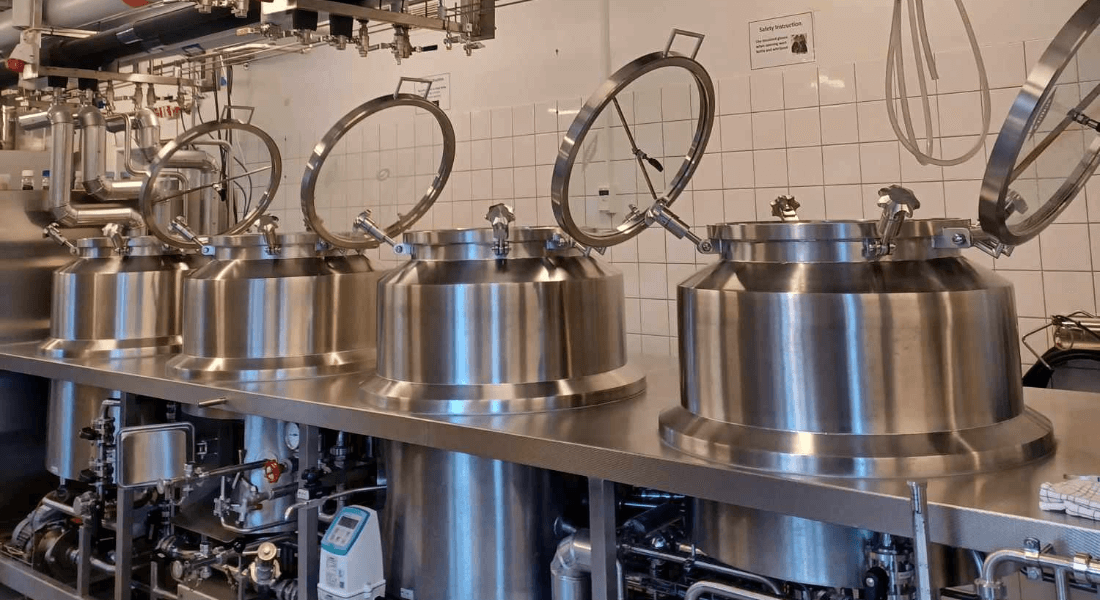Biosolutions
Naturen har sine egne "løsninger" på forandringer i klima og miljø. Ved at hjælpe disse naturlige tilpasninger på vej med moderne teknologi kan vi skabe nye bæredygtige løsninger til den grønne omstilling. Vores forskningsnetværk "Biosolutions" undersøger både den naturvidenskabelige side af disse løsninger, men også de samfundsmæssige, juridiske og kulturelle barrierer for at bruge biosolutions.
Gennem millioner af års evolution har naturen udviklet kraftfulde mekanismer, der gør den i stand til at tilpasse sig ændringer i miljøet og forsvare sig mod trusler som skadedyr og sygdomme.
Ved at kombinere disse naturlige værktøjer med moderne teknologi kan vi skabe bæredygtige løsninger på klima- og miljøudfordringer, der er relateret til fødevareproduktion, forurening, byggematerialer, pesticider og affald. Disse metoder kalder vi for biosolutions.
Biosolutions som grøn løsning
Biosolutions spiller allerede i dag en vigtig rolle i den grønne omstilling.
I såkaldt "præcisionsfermentering" kan vi "redesigne" mikroorganismer, der allerede findes i naturen, ved hjælp af genteknologi. På den måde kan de producere proteiner eller andre stoffer, der normalt kun kan fremstilles ved brug af dyr og fossile ressourcer. I præcisionsfermentering kræver det blot en ståltank, sukker, ilt og grøn energi.

På samme måde kan genetisk modifikation gøre afgrøder mere tilpasningsdygtige over for vejrets ændringer, eller gøre dem resistente over for skadedyr og sygdomme. På den måde kan brugen af pesticider reduceres eller helt elimineres.
I "bioremediering" bruger vi mikroorganismer til at nedbryde forurenende stoffer i naturen, hvilket hjælper med at rense grundvand for tungmetaller eller nedbryde olieudslip.
Biosolutions på Københavns Universitet
Den teknologiske side af biosolutions er godt i gang, men biosolutions kan kun blive til virkelighed, hvis vi forstår, hvordan folk forholder sig til dem, og hvordan biosolutions bringer værdi til vores samfund.
Biosolutions kan kun blive til virkelighed, hvis vi forstår, hvordan folk forholder sig til dem, og hvordan biosolutions bringer værdi til vores samfund.
I forskningsnetværket "Biosolutions" har vi derfor ikke kun fokus på de teknologiske løsninger. Vi undersøger også en række spørgsmål, der relaterer sig til samfundsforhold, historie, kultur og jura:
- Er godkendelsen af nye biosolution-produkter for kompliceret i dag, og hvordan kan vi lette reguleringen uden at gå på kompromis med sikkerheden?
- Vil investorer anse biosolution-startups for at være for risikable at finansiere? Hvis ja, bør staten så træde til med støtte-ordninger?
- Hvornår er det etisk acceptabelt at modificere gener i planter og mikroorganismer? – og hvad skal der til for, at folk accepterer og vil bruge biosolutions?
For at besvare disse spørgsmål har vi ikke blot samarbejde mellem forskere, men også dialog med embedsværket, industrien og politikere. Kun gennem et tværfagligt samarbejde kan vi samle de nødvendige indsigter og fremme disse nye løsninger.
Forskere i netværket
| Svend Christensen | Department of Plant and Environmental Science | Faculty of Science |
| Department of Geosciences and Natural Resource Management |
Faculty of Science | |
| Linda Nielsen | Centre for Market and Economic Law |
Faculty of Law |
| Henrik Siegumfeldt | Department of Food Science |
Faculty of Science |
| Asger Mose Wingender | Department of Economics |
Faculty of Social Sciences |
|
Christian Gamborg |
Department of Food and Resource Economics University of Copenhagen |
Faculty of Science |
Læs hele netværksbeskrivelsen (på engelsk)
Aim
BioSolutions is a multidisciplinary approach that seeks to solve complex problems and promote sustainable and efficient agriculture, industrial, food, and ingredient productions by leveraging biological processes or bio-based components. The aim of the UCPH thematic BioSolution is to obtain and disseminate a deep scientific understanding of the complex interactions between nature, social, economic, and environmental systems and innovate multidisciplinary solutions that can address these challenges while promoting sustainable practices and technologies.
Description
The BioSolutions approach is based on four solution categories: agricultural, industrial, food and ingredient, and environmental solutions. In the agricultural sector, BioSolutions involve breeding plant varieties to mitigate and adapt to the impacts of climate change, upcycling side streams from industry and agriculture, refining animal feed, and developing biofertilizers and plant Biologicals. These solutions aim to promote sustainable and efficient agriculture by reducing waste, increasing efficiency, and conserving resources.
In the industrial sector, BioSolutions involve converting biomass into biofuels, bioplastics, and other renewable materials, producing biocatalysts to increase efficiency, reduce waste, lower energy consumption, and produce biodegradable materials from renewable sources. These solutions aim to promote sustainable industrial practices and reduce the environmental impact of industrial processes.
In the food and ingredient sector, BioSolutions involve utilizing conventional and precision fermentation processes to improve efficiency, reduce waste, and enhance product quality. Precision fermentation techniques are used to produce alternative proteins that are sustainable, scalable, and cost-effective. BioSolutions also include utilizing microbial cultures to enhance nutrient absorption and bioavailability of food products and promote health benefits.
In the environmental sector, BioSolutions involve bioremediation to filter or degrade contaminated soil and groundwater, bioremediation of pollutants from air or water, biofiltering for constructed wetlands, and biological and natural processes to recycle and conserve resources. These solutions aim to promote sustainable environmental practices and reduce the environmental impact of human activities.
From social science and humanity perspectives, BioSolutions recognize the importance of human behavior and decision-making in achieving sustainability goals. It involves understanding the social, cultural, and economic factors that influence the adoption of sustainable practices and technologies. For example, BioSolutions could involve working with farmers to understand their needs and preferences when developing new plant varieties or promoting the use of biofertilizers.
In addition, BioSolutions also recognize the role of law and policy in achieving sustainability goals. It involves understanding the legal frameworks and regulatory systems that govern the use of biological processes and biotechnology. BioSolutions could involve advocating for policy changes to promote the adoption of sustainable practices or ensuring that the use of biotechnology is regulated in a way that protects human health and the environment, but at the same time tries to create legal frameworks and administrative procedures, that live up to the ambition in EU's Green Deal Industrial Plan to secure "a predictable coherent and simplified regulatory environment".
